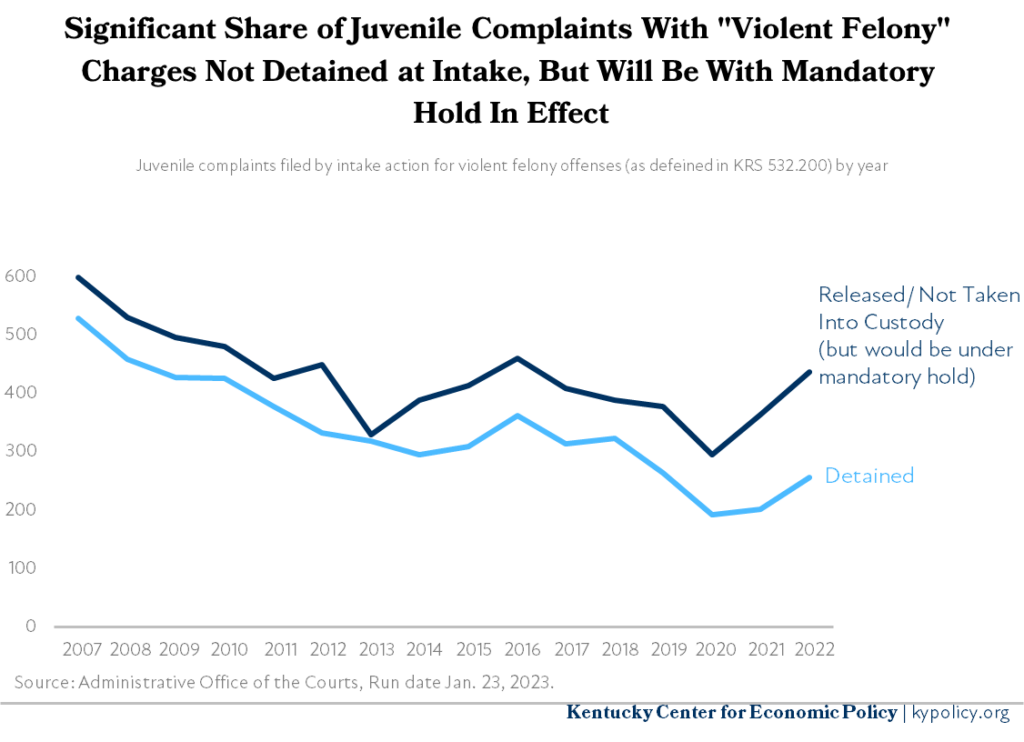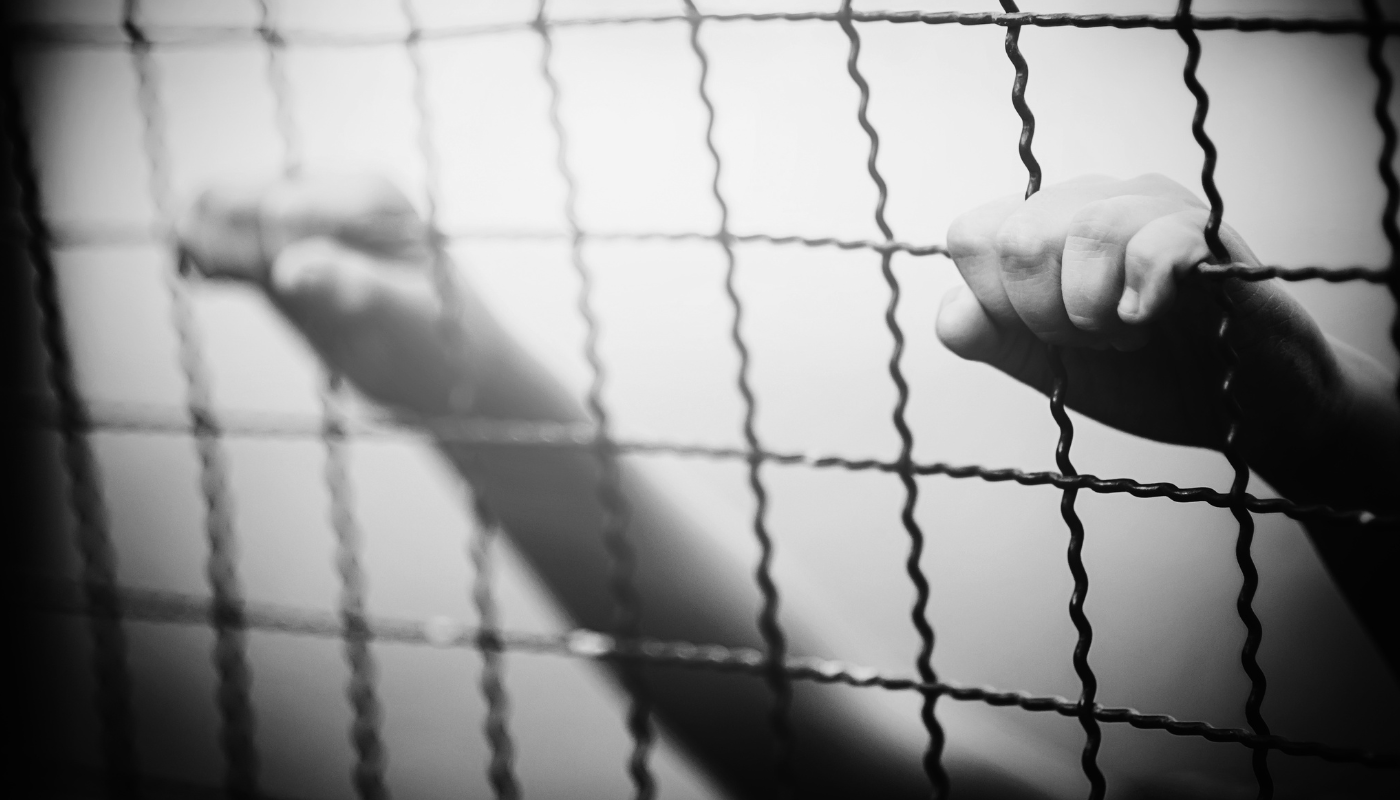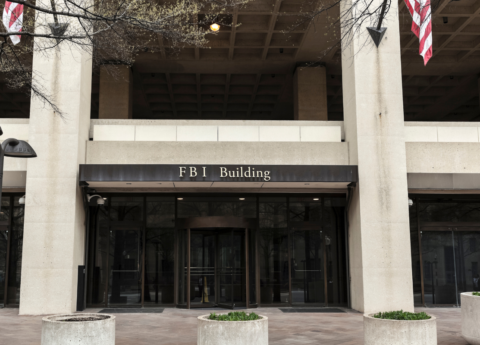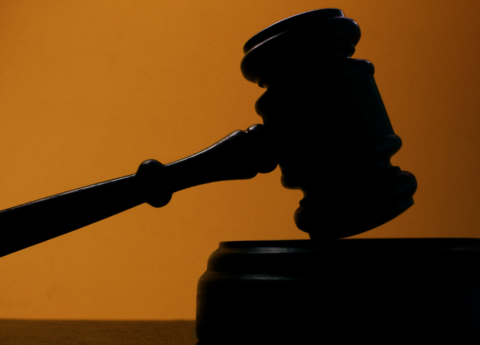Several of the most harmful criminal legal system policy changes in recent Kentucky history go into effect this month, increasing incarceration among children and adults alike. House Bill (HB) 5 — which has been called “the cruelest criminal-justice bill in America” — will be implemented starting July 15.1 In addition, two harmful juvenile system changes also go into effect this month: Senate Bill (SB) 20 on the 15th, and a delayed provision in HB 3 from 2023 starting today.
Here’s what this means for Kentucky communities.
Starting today, more kids will be locked in the state’s troubled juvenile detention facilities
In 2023, the General Assembly passed HB 3, a sweeping juvenile justice bill to harshen penalties for children. All but one of HB 3’s provisions have already taken effect. The final provision, a “mandatory hold,” was delayed until July 1, 2024 to allow time for progress to be made on the Louisville detention facility, which is still closed. With the mandatory hold now in effect, Kentucky can expect to see more children in detention, at a time where the Department of Juvenile Justice (DJJ) is under scrutiny for the treatment of children in the same facilities.
As of today, any child who is charged with a “violent felony offense” as defined by statute must be detained, for up to 48 hours (not including weekends or holidays) pending a detention hearing in front of a judge. This could affect a significant number of kids because Kentucky law is much broader than most states in what it categorizes as a “violent” offense.2
This mandatory detention requirement removes discretion from law enforcement, judges, and Court Designated Workers, who previously could consider the facts and circumstances for each case and make a detention decision prior to a formal hearing.3 Now, this discretion does not exist until a formal hearing occurs, which depending on court scheduling and transportation — something that differs in each county — can take days.
Not only is any amount of time in detention harmful for children, but it also increases their likelihood of future system involvement; and Kentucky’s DJJ detention facilities are not equipped to care for the additional children it will now be required to house, even if those kids are held for a short period of time. Kentucky’s juvenile system continues to be under scrutiny for the treatment of children in its care and chronic staffing challenges. And Administrative Office of the Courts (AOC) data shows that hundreds more kids each year who would otherwise have been released could now be detained.

Another provision requires that all children who are detained be evaluated for behavioral health services and substance use treatment needs while in the DJJ facility. While a treatment-focused approach is best, it will be difficult for practitioners to adequately evaluate children whose length of stay has not yet been determined and connect them to proper services.
Additionally, implementing the mandatory hold when minimal progress has been made on Louisville’s detention facility – which HB 3 appropriated $17.1 million to renovate – will be harmful to Jefferson County children who are often detained in counties hours away from home. Some lawmakers recognized this issue, but attempts to delay the mandatory hold did not pass.
Later in the month more Kentucky kids will be prosecuted as adults
Another damaging juvenile system law goes into effect July 15. SB 20 requires children to be tried as adults in some instances where there is an allegation that a gun was involved in a crime. Under the new law, the allegations do not require that the gun be used. Nor does it specify that only the child in possession of the gun be tried as an adult. This will likely result in groups of children being sent to adult court regardless of their level of culpability. This reverses a positive change from just three years ago that ended automatic transfer of children to adult court and placed discretion back in the hands of the judge.
Research shows that trying children as adults is harmful and not a deterrent to committing offenses. It also results in higher likelihood of system involvement as an adult. Black children are disproportionately represented in the cases of Kentucky kids prosecuted as adults and will likely be the demographic most harmed as this law goes into effect.
Starting July 15, HB 5 will bring immediate harm that will compound over time
HB 5 goes into effect on July 15 as well. Its devastating impacts will be experienced immediately across the state and will also compound exponentially over time. Among many changes to the law, HB 5 criminalizes homelessness, adds six new offenses to the already broad violent offender statute, expands the death penalty, creates a “drug-induced homicide” law and restricts charitable bail organizations.
Supporters of this bill cited a false narrative of a violent crime wave and a need to make Kentucky communities safer as motivation for HB 5, but research disproves notions that there is a crime wave and that the provisions in HB 5 will lead to safer communities. Rather than improving safety, HB 5 will make it harder for unhoused people, many of whom live in communities without a shelter, to stay safe, and to become economically stable. People will also likely be even more afraid to call for help when someone is experiencing an overdose because of the harsher criminal penalties for fentanyl.
HB 5 will also lead to an increased financial burden on the state since it increases many already-lengthy sentences for felonies. County-level costs are also likely to rise. One expected driver of those costs is the increase in pre-trail detention that will come with HB 5’s expansion of the criminal code. Those cases often take more time to litigate, costing counties more and keeping people detained longer. These new costs to counties will make it even harder for communities to afford the services and supports that actually make people safer.
Long term, HB 5 will cost more than $1 billion over the next decade in increased incarceration costs and require several thousand more jail and prison beds in the commonwealth.
2024 General Assembly worsened Kentucky’s mass incarceration crisis
Ten other recent changes to Kentucky’s criminal code that will increase incarceration become law this month as well, continuing the state’s trend of passing far more laws that increase incarceration than decrease it.4 In fact in 2024 there were no bills that reduced incarceration.
Thirteen years after the state’s significant criminal legal system reform bill in 2011 intended to reduce the state’s high incarceration levels, the Kentucky General Assembly has now enacted 87 laws increasing incarceration but only 14 reducing it. Unsurprisingly, a recently-updated analysis comparing incarceration around the globe found that if Kentucky were a country, it would be the seventh most-incarcerated place in the world.

Ultimately, the Kentucky General Assembly continues to drive up incarceration with little attention to the impact these laws have on struggling communities. Increased criminal penalties come with human and fiscal costs that already burden Kentuckians but will become even more pronounced as these new laws take effect.
- Per the Kentucky Constitution, most legislation (aside from general revenue bills and bills with emergency clauses) goes into effect 90 days after the conclusion of a legislative session. The 2024 session concluded on April 15, 2024.
- Most other states do not define burglary (which has been shown to rarely involve physical violence or even the possibility of physical violence), arson, escape or the attempt to commit any of these offenses as violent as “violent offenses,” but Kentucky law does.
- According to Administrative Office of the Courts (AOC) data, when law enforcement requests that a judge detain a child, the child is almost always detained. However, judges have discretion to not detain and to set other conditions of release due to the circumstances of the case and the child’s life.
- KyPolicy tracks individual bills that increase or decrease penalties for existing felonies, create new felonies, or broadly legalize previously criminal activity. This count does not include misdemeanors, fines, fees, citations or juvenile-specific bills. This count is updated at the end of each legislative session.




